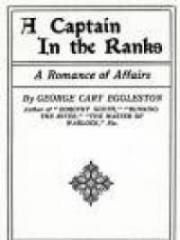 A Captain in the Ranks Part 6
A Captain in the Ranks Part 6
He asked the question precisely as he might have done if he had resented the saving of his wealth of cotton.
"Oh, it was simple enough. The fire meant damage, and I was there. So, of course, I put it out."
"But why? The cotton wasn't yours, and you hadn't been hired to watch it."
"No, of course not. But when a gentle----I mean when any decent man sees property afire he doesn't ask whose it is before putting out the blaze."
"You're a Virginian, I should say, from your voice--late of the rebel army. What's your rank?"
"None now. I've put the war completely behind me. I'm beginning life anew."
"Good! I wish everybody, north and south, would do the same. But fools won't, and men are mostly fools, you know. When did you get to Cairo?"
"About five minutes before you saw me putting out the fire. I came down the river on the big tow boat."
"Where's your baggage?"
"On my back. I have no other clothes. I'll buy some when I earn some money."
"Where have you been since the surrender?"
"Making my way West."
"How?"
"On foot to Wheeling. Then on the tow boat."
"What fare did they make you pay?"
"None. I worked my way as a stoker--fireman they call it out here."
"No wages? Just pa.s.sage and grub?"
"That was all."
"What have you got on your wheel house?"
"I fear I don't understand."
"Oh, that's river slang. You know every side-wheel steamer has a statement of her destination painted on her wheel house. I meant to ask what are your plans?"
"To find work and do it."
"What kind of work?"
"Any kind that's honest."
"You are educated, I suppose?"
"Yes, in a way. I'm an A. M. and a graduate in law."
"Know anything about business?"
"No, but I shall learn."
"If you can, you mean?"
"Oh, I can. A capable man can learn anything if he really wants to."
"I don't know about that. But I'll gamble on the proposition that you can."
"Thank you."
"No thanks are needed. I wasn't complimenting. I was just expressing an opinion."
Scribbling a memorandum on a sc.r.a.p of paper, Captain Hallam handed it to Duncan, saying:
"Give that to the cashier as you go out, and get your wages. Then you'd better get your breakfast. I recommend you, while you're poor, to eat at the little booths along the levee, where they sell very good sandwiches and coffee cheap. After breakfast, if you choose to come back here I'll try to find something for you to do. Oh, I forgot. You were up all night, so you'll want to sleep."
There was an interrogative note in the last sentence. Captain Hallam was "sizing up" his man, and he closely scrutinized Duncan's face as the answer came.
"Oh, I'm used to night duty. I'm ready for a day's work if you can give me one. As for breakfast, I've had it."
"Then you had money?"
"A very little; but I didn't spend any of it. I sawed and split a load of wood for the keeper of a booth, and he gave me some bread and ham and coffee for my work."
"Oh, that's the way you managed it. Very well. Come back here in two hours anyhow."
After the young man had pa.s.sed out, Captain Hallam said to one of his partner brothers:
"That fellow is a good sort. He has sand in his gizzard. When he comes back set him at work at something or other--several things in succession in fact--and find out what he can do."
Such was Guilford Duncan's mustering into the new service of work.
VIII
ON DUTY
During the next four or five days Guilford Duncan was kept busy with various small employments, some of them out of doors and some of them in the office. During this time Captain Hallam did not again engage him in conversation, but Duncan knew that the man of business was closely observing his work. He was not slow to discover that he was giving satisfaction. He saw that with each day the work a.s.signed him was of a kind that required a higher intelligence than that of the day before.
Every evening the cashier paid him his day's wages, thus reminding him that he was not a salaried employee of the house, but a man working for wages from day to day.
Out of his first wages he had purchased a change of very cheap underwear, a towel, and a cake of soap. Every morning about daylight he went to a secluded spot on the levee, for a scrub and a swim. Then he washed out his towel and placed it with his other small belongings, in a storage place he had discovered in a great lumber pile.